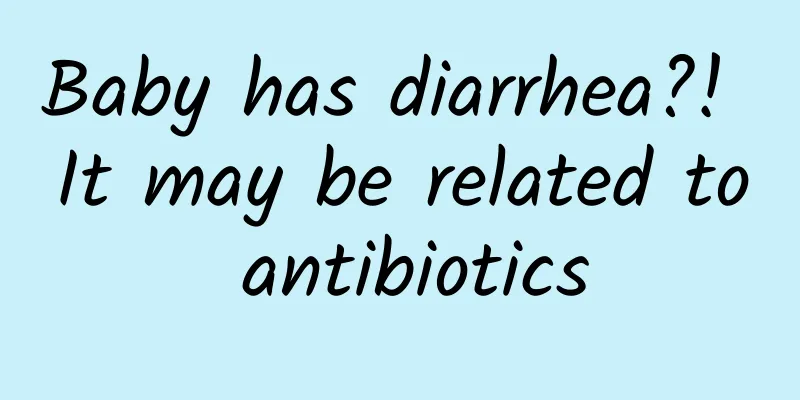Baby has diarrhea?! It may be related to antibiotics

|
I believe everyone is familiar with antibiotics, but some babies may have diarrhea after taking antibiotics. We call this kind of diarrhea that occurs with the use of antibiotics and cannot be explained by other reasons antibiotic-associated diarrhea (AAD). Which antibiotics are likely to cause AAD? The incidence of AAD is related to the antibiotics used. Studies have shown that, except for vancomycin and aminoglycoside antibiotics, most antibiotics can cause AAD. This is especially true for antibiotics whose antibacterial spectrum covers intestinal anaerobic bacteria and have high concentrations in the intestinal cavity [1]. Cephalosporins, broad-spectrum penicillins, amoxicillin, etc. have a higher risk of causing AAD, and the more types of antibiotics used and the longer the time, the higher the risk of AAD. Which babies are prone to AAD? The incidence of AAD is also closely related to the baby's own factors. Previous AAD epidemiological studies have shown that younger, malnourished, and immunocompromised babies are more likely to develop AAD. Poor basic conditions, surgery, and the use of gastrointestinal motility drugs and proton pump inhibitors can also lead to an increased incidence of AAD [2]. Why do babies develop AAD? AAD in babies is usually divided into two categories: non-infectious and infectious, depending on whether pathogens are involved. Non-infectious AAD can also be called functional AAD, and its main causes are the direct effect of antibiotics and the destruction of normal intestinal flora caused by the use of antibiotics. Infectious AAD is mainly caused by antibiotics causing intestinal flora imbalance, destruction of normal flora, and over-growth of conditional pathogens, leading to diarrhea of varying degrees of severity. The main pathogen that causes infectious AAD is Clostridium difficile. Related studies have shown that diarrhea caused by Clostridium difficile accounts for 10%-25% of AAD. If your baby has AAD, how should it be treated? 1) Antibiotics should be discontinued or replaced; 2) Antibiotic treatment: Metronidazole can be given to patients with mild or moderate C. difficile AAD, and vancomycin can be given to patients with severe C. difficile AAD or those who do not respond well to metronidazole. 3) Symptomatic supportive treatment, including symptomatic fluid replacement, correction of water and electrolytes, etc.; 4) Intestinal flora regulation therapy: Some clinical trials have confirmed that Lactobacillus casei and Lactobacillus rhamnosus can be used to treat AAD[3]. In order to avoid the occurrence of AAD, how should we prevent it? 1) Do not abuse antibiotics and avoid frequent changes of antibiotics; 2) Try to choose drugs that have less impact on intestinal flora; 3) The use of microecological preparations can prevent AAD. Probiotics such as Bifidobacterium and Lactobacillus can reduce the incidence of AAD [4]; 4) Avoid giving your baby any examinations or treatments that may damage their intestines as much as possible. In recent years, the incidence of antibiotic-associated diarrhea has become increasingly high. Severe diarrhea can cause dehydration, acid-base imbalance, and electrolyte imbalance in babies. Therefore, mothers must pay great attention to not use antibiotics on their children as soon as they have a fever or a cold. They must go to a regular hospital for relevant examinations and then select antibiotics in a targeted manner according to the doctor's diagnosis and doctor's advice. References [1]Bergogne-Bérézin E. Treatment and prevention of antibiotic associated diarrhea [J]. Int J Antimicrob Agents, 2000, 16(4): 521-526. [2]Elseviers MM, van Camp Y, Nayaert S. Prevalence and management of antibiotic associated diarrhea in general hospitals [J]. BMC Infect Dis, 2015, 15: 129. [3]McFarland LV. Evidence-based review of probiotics for antibiotic-associated diarrhea and Clostridium difficile infections[J]. Anaerobe, 2009, 15(6):274-280. [4]Issa I, Moucari R. Probiotics for antibiotic-associated diarrhea: Do we have a verdict?[J]. World J Gastroenterol, 2014, 20(47): 17788-17795. (Li Jinshi, Changchun Children's Hospital) |
<<: Eat 8,400 bacteria in one bite? A must-eat food in summer nearly killed a family of three!
>>: There are so many things to pay attention to when injecting insulin. Are you doing it right?
Recommend
Can I drink chrysanthemum and wolfberry tea during menstruation?
Chrysanthemum and wolfberry tea is a common milk ...
What symptoms does a pregnant woman have before giving birth?
There is no doubt that you need to prepare a lot ...
Which is better, minimally invasive abortion or painless abortion?
Minimally invasive abortion and painless abortion...
Can pregnant women eat rice noodles?
Can I eat cross-bridge rice noodles during early ...
Belly bulge during menstruation
During menstruation, due to pelvic congestion, bl...
Can I get pregnant if I ejaculate outside during my pregnancy?
As we all know, if you do not use contraceptive m...
Does a positive BV status affect pregnancy?
The result of a positive Bv test is that the numb...
Why is it difficult to get pregnant with cold uterus?
Uterine cold refers to insufficient kidney yang i...
Breast hyperplasia can be treated with salt hot compress
The breasts can be heated with salt. There are tw...
Can I drink pigeon soup after giving birth?
Pigeons themselves are rich in nutritional value,...
What should I avoid eating if I have polycystic ovary?
Polycystic ovary is a relatively common gynecolog...
Is breast cancer serious?
The most troubling problems for women are breast ...
What causes black labia?
The darkening of the labia is generally caused by...
Does a long menstrual cycle affect pregnancy?
If a woman wants to get pregnant, she must adjust...









